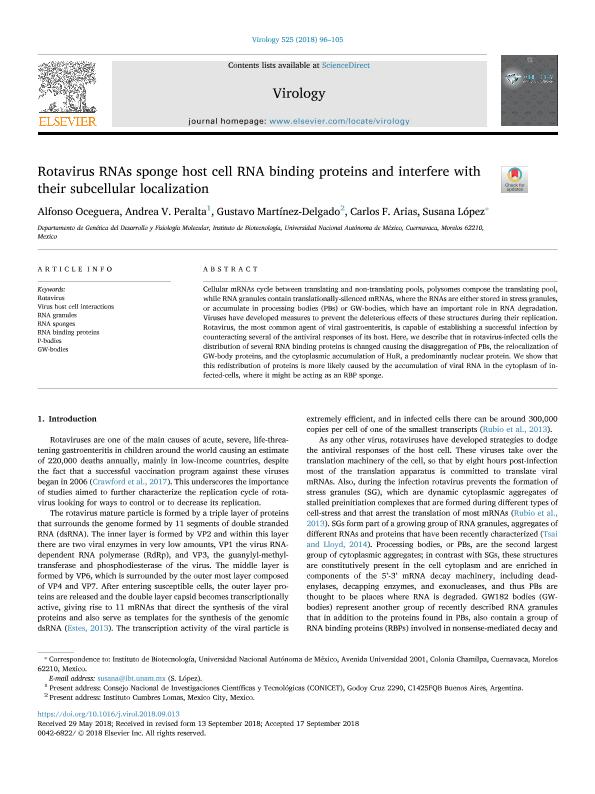Artículo
Rotavirus RNAs sponge host cell RNA binding proteins and interfere with their subcellular localization
Oceguera, Alfonso; Peralta, Andrea Verónica ; Gustavo Martinez Delgado; Arias, Carlos F.; López, Susana
; Gustavo Martinez Delgado; Arias, Carlos F.; López, Susana
 ; Gustavo Martinez Delgado; Arias, Carlos F.; López, Susana
; Gustavo Martinez Delgado; Arias, Carlos F.; López, Susana
Fecha de publicación:
12/2018
Editorial:
Academic Press Inc Elsevier Science
Revista:
Virology
ISSN:
0042-6822
Idioma:
Inglés
Tipo de recurso:
Artículo publicado
Clasificación temática:
Resumen
Cellular mRNAs cycle between translating and non-translating pools, polysomes compose the translating pool, while RNA granules contain translationally-silenced mRNAs, where the RNAs are either stored in stress granules, or accumulate in processing bodies (PBs) or GW-bodies, which have an important role in RNA degradation. Viruses have developed measures to prevent the deleterious effects of these structures during their replication. Rotavirus, the most common agent of viral gastroenteritis, is capable of establishing a successful infection by counteracting several of the antiviral responses of its host. Here, we describe that in rotavirus-infected cells the distribution of several RNA binding proteins is changed causing the disaggregation of PBs, the relocalization of GW-body proteins, and the cytoplasmic accumulation of HuR, a predominantly nuclear protein. We show that this redistribution of proteins is more likely caused by the accumulation of viral RNA in the cytoplasm of infected-cells, where it might be acting as an RBP sponge.
Archivos asociados
Licencia
Identificadores
Colecciones
Articulos(SEDE CENTRAL)
Articulos de SEDE CENTRAL
Articulos de SEDE CENTRAL
Citación
Oceguera, Alfonso; Peralta, Andrea Verónica; Gustavo Martinez Delgado; Arias, Carlos F.; López, Susana; Rotavirus RNAs sponge host cell RNA binding proteins and interfere with their subcellular localization; Academic Press Inc Elsevier Science; Virology; 525; 12-2018; 96-105
Compartir
Altmétricas



